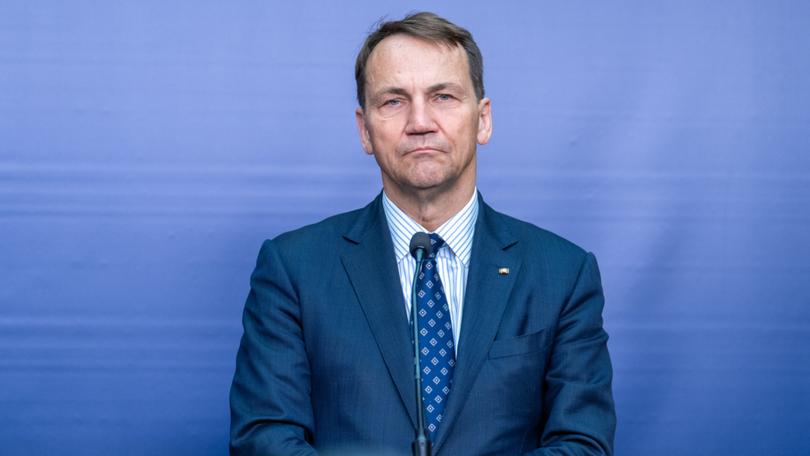Algorithm ban: Radoslaw Sikorski, Poland, says government must address conspiracies and misinformation
We hear a lot about the algorithm, but what is it? One of Europe’s most prominent foreign ministers has likened it to subliminal advertising, banned from televisions in Europe and Australia last century.

Governments should ban algorithms if the big tech companies continue to refuse to stop the spread of conspiracy theories and misinformation on social media platforms, one of Europe’s most prominent foreign ministers has said.
Poland’s foreign minister Radoslaw Sikorski said algorithms were designed to prey on negative emotions and were destroying people’s trust in what was factual as well as screwing up children’s minds.
“I would ban algorithms on social media,” he told the London-based foreign policy think tank Chatham House.
Sign up to The Nightly's newsletters.
Get the first look at the digital newspaper, curated daily stories and breaking headlines delivered to your inbox.
By continuing you agree to our Terms and Privacy Policy.“There is nothing sacred about exploiting our anger, undermining our democracy and screwing up children’s minds.”
Speaking a short time later to The Nightly, Mr Skikoski said social media was “clearly damaging trust that is an indispensable part of our democratic process.”
“Trust in institutions, trust towards politics, trust towards facts,” he said.
He said the traditional media was regulated and laws governing social media were well overdue.
“The role of traditional media is not to repeat every conspiracy and every piece of nonsense that you hear but to filter and to grade, this is important, this is just tittle-tattle,” he said.
“To be nexuses of quality.
“If social media that makes billions of dollars every annum from their activities don’t take on the duties that media also have in society then I think we should regulate them, just as we regulated the press, the radio and the TV when they were first invented.”
He likened algorithms to subliminal advertising which was banned from televisions in the UK, Europe and Australia last century.
“If something’s bad for us, in our judgement, then we can ban it.”
Mr Sikorski said “humanity’s last hope” was the European Parliament as it was the only jurisdiction outside of the United States, where Meta and X are based.
“Because we are big enough and we are not yet captured by the companies,” he said.
But when asked if he supported a TikTok ban, as is proposed in the United States, unless parent company ByteDance divests from Chinese ownership, Mr Sikorski said he did not know enough about the issue to comment.
His comments reflect a widening backlash against the use of smartphones and social media, particularly for children.
Opposition Leader Peter Dutton has pledged to ban social media for under 16s and introduce laws within his first 100 days.
Prime Minister Anthony Albanese followed suit and labelled social media a scourge.
Earlier this year, the government established a parliamentary inquiry into social media influence and the impacts of social media on Australian society.
Communications Minister Michelle Rowland said in a statement that the government was actively attempting to hold digital platforms to account in the interests of safety.
“Including through our amendments to the Basic Online Safety Expectations, reviewing the Online Safety Act, investing in a $6.5 million trial of age assurance technologies and establishing a Joint Select Committee into the influence and impacts of social media on Australian society,” the Minister said.
“We will also be introducing new legislation this year which will provide the Australian Communications and Media Authority with new powers to combat mis- and disinformation on digital platforms.
Ms Rowland claimed Australia was “at the forefront of addressing harms associated with social media.”
“Australia’s world-leading online safety regulator has also issued notices requiring industry to develop codes to protect children online, which could include ensuring recommender systems and algorithms don’t promote harmful content,” she said.
However, the Australian government’s attempts to hold US tech giants accountable have failed.
For example, the e-safety commissioner threatened to sue X, which is owned by Elon Musk, a declared financial backer of Donald Trump over his defiance of an order to remove video of the Sydney terrorist attack in which a church leader was stabbed.
Meta, which owns Instagram and Facebook, complied.
Jonathan Haidt, author of The Anxious Generation, which advocates banning smartphones for children entirely, said that authoritarian actors had a huge stake in dismantling liberal democracies and would use AI to turbocharge their efforts.
“So I think we’re going to have a lot of chaos, a lot of subversion,” he told The Nightly.
“The emerging axis of Russia, Iran and North Korea and sometimes China – those countries have a real invested interest in the failure of liberal democracy, just as Mussolini and Hitler did in the thirties.”
Mr Haidt said the super-empowerment of every individual with the ability to self-publish was one of many factors eroding the strength of democracy and that it was only going to get worse unless curbed.
“Anyone is super-empowered to make videos of anyone saying anything that is completely realistic,” he said.
“The Soviets spent so much time and money sending agents over to the US, they discovered by 2015 you don’t have to, you can just make fake personas on the internet.
“And now with AI, they’re all going to be super-empowered – AI is going to make authoritarians better at being authoritarian and democracies worse at being worse.”
In April, Microsoft said China was using fake social media accounts to poll voters on what divides them most, “to sow division and possibly influence the outcome of the U.S. presidential election in its favour.”
“China has also increased its use of AI-generated content to further its goals around the world,” Microsoft’s Threat Intelligence report said.

